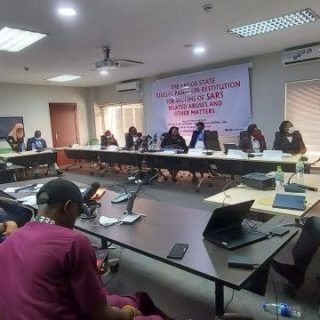Citizen is a column that explains how the government’s policies fucks citizens and how we can unfuck ourselves.
A local government is an important part of governance in Nigeria. Local governments supplement the work of the federal government and the 36 state governments by administering a particular area.
However, many Nigerians always complain about the federal government and state governments while ignoring that there is also a local government.
In fact, if many local governments in Nigeria do their jobs more effectively, then Nigeria would be a better place. They are the government closest to the people and can ensure the maintenance of many public facilities that are crucial to the lives of the average Nigerian, like public markets and many other public utilities.
Read: Dino Melaye Wrote A Book About Corruption And We Just Have Some Questions
Laws Guiding Local Governments In Nigeria
Section 1(6) of Nigeria’s constitution states that “There shall be 768 Local Government Areas in Nigeria, and six area councils as shown in Part 2 of that schedule.” This is interpreted to mean that Nigeria has 774 local governments.
Furthermore, section 8 of the constitution explains that the system of local government councils is guaranteed in Nigeria, and every state in Nigeria must enact a law that provides for the establishment, structure, composition, finance and function of such councils.
Functions of a Local Government In Nigeria
Under the fourth schedule of Nigeria’s constitution, the main functions of a local government council in Nigeria include:
- consideration and the making of a recommendation to the state commission on economic planning, or any other similar body on the economic development of the state as they affect the local government;
- collection of rates, radio and television licences;
- establishment and maintenance of cemeteries, burial grounds and homes for the homeless or sick;
- licensing of bicycles, trucks, canoes, wheel-barrows and carts;
- establishment, maintenance and regulation of slaughter-houses, slaughter slabs, markets, motor parks and public conveniences;
- construction and maintenance of roads, street lightings, drains and other public highways, gardens, open spaces or such other public facilities as prescribed from time to time by the House of Assembly of a state;
- The naming of roads and streets and numbering of houses;
- provision and maintenance of public conveniences, sewage and refuse disposal facilities;
- registration of all births, deaths and marriages;
- assessment of privately owned houses for property taxes and for other purposes as may the prescribed by the House of Assembly of a state;
- control and regulation of:
- outdoor advertising and hoarding;
- movement and keeping of pets of all description;
- shops and kiosks;
- restaurants, bakeries and other places for sale of food to the public;
- laundries; and
- licensing, regulation and control of the sale of liquor.
Furthermore, section 2 of the fourth schedule of the constitution describes the general functions of a local government in partnership with the state government to include:
- provision and maintenance of primary, adult and vocational education;
- development of agriculture and natural resources, except the exploitation of mineral resources;
- provision and maintenance of health services; and
- other functions that may be given to it by the House of Assembly of a state.
Read: What Is Your Local Government Chairman’s Name?
Some Facts About Local Governments In Nigeria
Obio-Akpor local government in Rivers State is described as the richest local government in Nigeria, followed by Ikeja local government area in Lagos State. Obio-Akpor is one of the leading economic zones in Nigeria with a huge deposit of oil, gas and mineral resources, while Ikeja local government in Lagos state is home to one of Nigeria’s biggest international airport and the largest shopping mall in Lagos – the Ikeja City Mall.
Other notable local governments in Nigeria are the Lagos Island local government, the Bonny Island local government and the Abuja municipal local government.
Also, local governments in Nigeria are funded through the Federal Account Allocation Committee (FAAC) disbursement, which is shared monthly to the federal, state and local governments in Nigeria.
However, many local governments in Nigeria are still non-functional, and it hard to really feel their impact on the day-to-day lives of many Nigerians.
Going by this, it is clear that a local government plays a very important role in governance in Nigeria. If local governments in Nigeria are efficient, then there is no doubt that life will get better for the average Nigerian. Nigerians must therefore pay attention to reforming local government and voting in the best local government administrators so that public infrastructure can improve and quality of life for the average Nigerian can also improve.
Quiz: What Do You Know About Local Government In Nigeria?
We hope you’ve learned a thing or two about how to unfuck yourself when the Nigerian government moves mad. Check back every weekday for more Zikoko Citizen explainers.
COMPONENT NOT FOUND: donation




